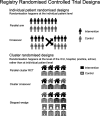Registry randomised trials: a methodological perspective
- PMID: 36858472
- PMCID: PMC9980340
- DOI: 10.1136/bmjopen-2022-068057
Registry randomised trials: a methodological perspective
Abstract
Registry randomised clinical trials (RRCTs) have the potential to provide pragmatic answers to important clinical questions. RRCTs can be embedded into large population-based registries or smaller single site registries to provide timely answers at a reduced cost compared with traditional randomised controlled trials. RRCTs can take a number of forms in addition to the traditional individual-level randomised trial, including parallel group trials, platform or adaptive trials, cluster randomised trials and cluster randomised stepped-wedge trials. From an implementation perspective, initially it is advantageous to embed RRCT into well-established registries as these have typically already overcome any issues with end point validation and adjudication. With advances in data linkage and data quality, RRCTs can play an important role in answering clinical questions in a pragmatic, cost-effective way.
Keywords: biotechnology & bioinformatics; public health; statistics & research methods.
© Author(s) (or their employer(s)) 2023. Re-use permitted under CC BY-NC. No commercial re-use. See rights and permissions. Published by BMJ.
Conflict of interest statement
Competing interests: CMR is funded through an NHMRC Principal Research Fellowship (GHT1136372). CH is funded by a National Heart Foundation Fellowship and an NHMRC Investigator Grant. JR is funded by an Australian Government Research Training Programme (RTP) Scholarship and a Monash University Graduate Excellence Scholarship.
Figures
References
-
- Australian Commission on Safety and Quality in Health Care . National arrangements for clinical quality registries. 2019. Available: https://www.safetyandquality.gov.au/our-work/indicators-measurement-and-... [Accessed 2 Dec 2020].
-
- Australian Government - Department of Health . National clinical quality registry and virtual registry strategy 2020-2030; 2021.
-
- Everett CC, Fox KA, Reynolds C, et al. . Evaluation of the impact of the grace risk score on the management and outcome of patients hospitalised with non-ST elevation acute coronary syndrome in the UK: protocol of the UKGRIS cluster-randomised registry-based trial. BMJ Open 2019;9:e032165. 10.1136/bmjopen-2019-032165 - DOI - PMC - PubMed
Publication types
MeSH terms
LinkOut - more resources
Full Text Sources


